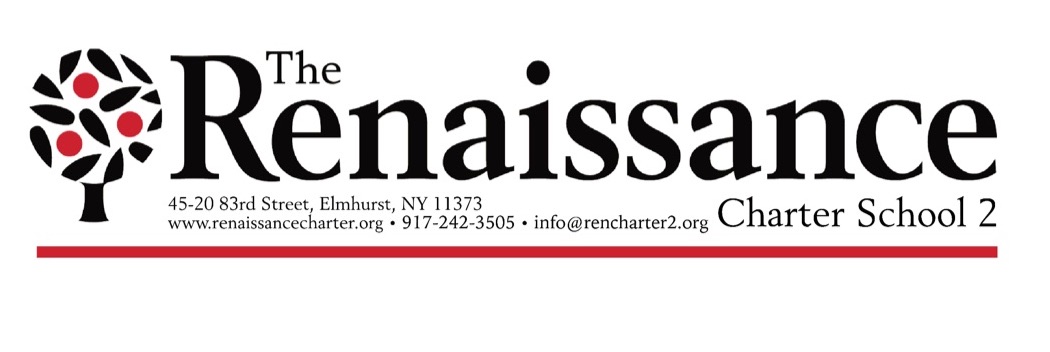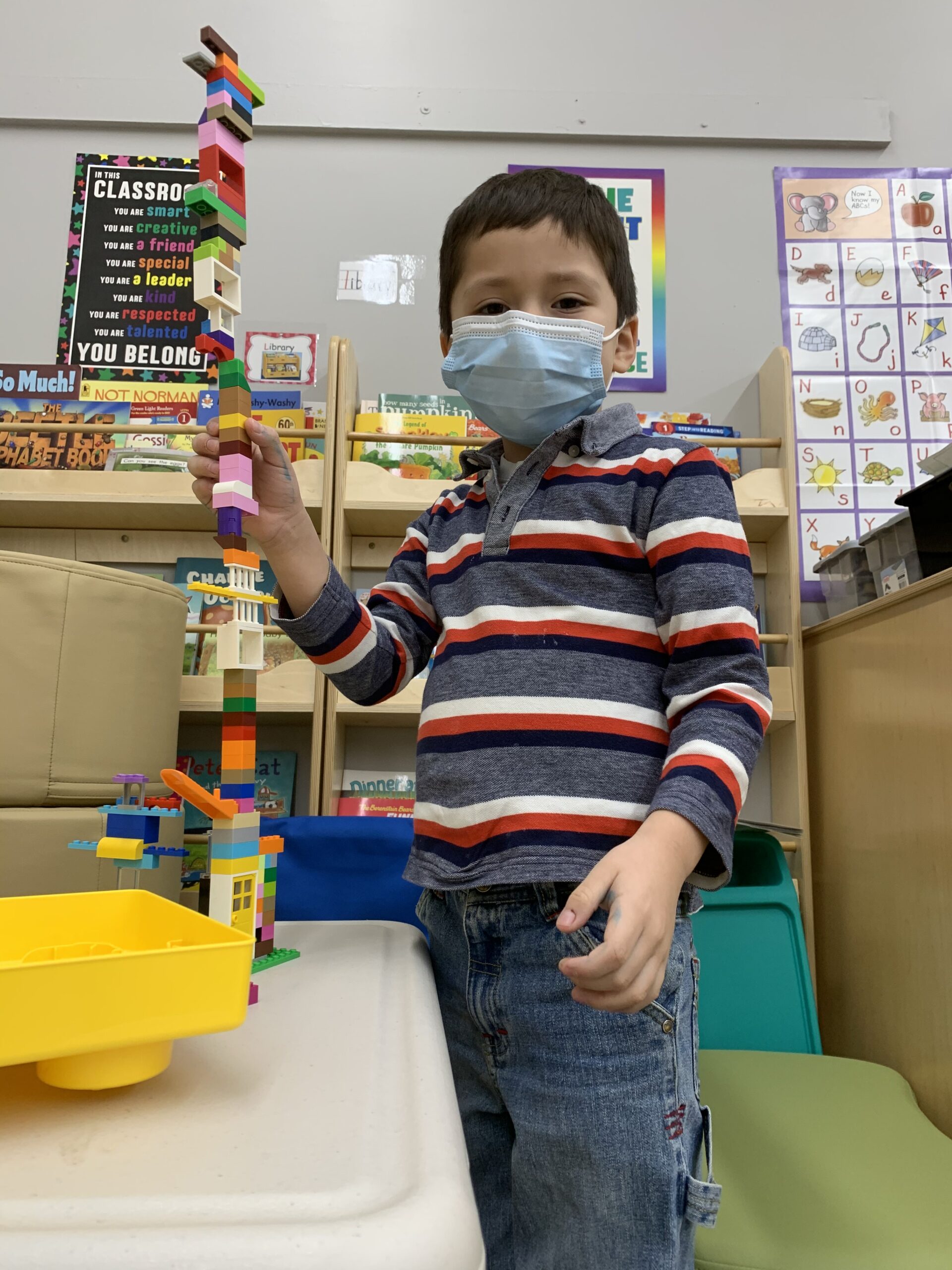The Renaissance Charter School 2 Curriculum
TRCS 2 opened its doors in September 2020 for hybrid (in-person/remote) learning. We have implemented all Covid related regulations to ensure the health and safety of our families. We have supported families with technology needs by supplying Chromebooks, headphones, online learning platforms, and technical assistance at no cost to our families. We continue to offer professional development opportunities to our teachers to support their growth as hybrid educators. We believe our strong partnership with families that have made this year a success.
- Renaissance, as a village, nurtures hearts and minds. Deep human bonds can be nurtured within a village that values respect and kindness. Students build open and trusting friendships with each other; staff members move beyond cooperation to the level of collaboration; staff members take on the role of mentors to students; parents are honored; and each level of the school communicates with each other. Minds open as hearts open.
- Renaissance values and protects the forums within its village. Important discussions take place in many of its centers: meetings of the Board of Trustees, the Collaborative School Governance (CSG), cluster and staff meetings, PTA, Student Council, cluster town meetings, and various committees. Informal discussions go on all the time, as well. It is only through participation in these forums that powerful and wise decisions can be made.
- Renaissance values the spirit of self-motivated and collaborative action. Renaissance was started by a group of individuals who wrote and submitted a proposal for a new theme-based school without the backing of any prominent organization. The group’s spirit that the impossible can become possible has continued to be a bedrock principle of the school. Renaissance honors dreams and gives full support to any of the members of the community—whether student, staff, or parent—who come up with ideas that they want to carry to fruition.
- Renaissance fights aggressively for the happiness and success of each student. With this commitment the school ensures that all of its accountability goals will be met.
Kindergarten Through Fourth Grade
The early childhood program at Ren 2 is designed to educate the whole child through a holistic approach to learning. Children will feel supported to take risks and explore. Children in kindergarten and first grade will challenge themselves with rigorous “hands-on, minds-on” instruction. Through centers-based learning, children interact, play, and learn while keeping engaged and excited.
In these early and formative years of school, children forge friendships that will endure a lifetime. They learn to love school and value the learning process. The various approaches that will be used at Ren 2 incorporate all multiple intelligences such as visual, auditory, and kinesthetic in order to reach every learner. We want Ren 2 children to run to school each day with an eagerness to learn knowing they are loved and valued.
Literacy
The literacy program is designed to help children build reading skills through motivating and engaging literature, a thorough phonemic awareness program while increasing the students’ reading comprehension strategies in fiction and non-fiction areas. Teachers carefully plan all lessons so that the instruction is differentiated and there is a strong emphasis on ongoing child/teacher conferences in reading and writing. Small groups are carefully crafted so that each skill is prioritized based on the group with children receiving focus on the right reading skill at the right time.
Our literacy program will include all three components of Lucy Calkins and TCRWP’s workshop. This model is rooted in these main areas: reading, writing, and phonics development. Children will have a reading and writing workshop each day where they will receive a comprehensive foundation in the reading and writing process.
Writing is taught through the use of the writing workshop model. We believe in using this model to foster the children’s work with phonics as well as incorporating the importance of grammar instruction through the organic process of writing. During the writing workshop, children become writers just like the authors who wrote their favorite stories. The children are asked to draft, revise, edit, and publish their pieces. Writing topics range from opinion to narrative to non-fiction research books. Teachers support children through writing mini-lessons where the teacher demonstrates the writing or grammar skills to be used by the children. The children’s writing evolves through the use of author studies and one on one writing conferences with the teacher.
Each day the children will participate in a reading workshop. The workshop prepares children to become confident readers. The workshop includes explicit instruction in reading skills and strategies that are tailored to enhance the child’s work during guided reading sessions.
For guided reading, your child will be supported with small group lessons that focus on specific targets for each learner using the Fountas and Pinnell Literacy program. The small groups allow the teacher to create lessons that are structured around the goals and needs of each child. During guided reading, the assistant teacher will be working in small groups to build on each child’s phonemic awareness using the Units of Study in Phonics. This program introduces phonics concepts and strategies that help children when reading and writing. Each child will be able to understand the process of reading and writing with a solid foundation in phonemic awareness.
The Daily 5 will be used in all classrooms as an extension of the learning process. The Daily 5 is comprised of five areas: Read to Self, Read to Someone (guided reading), Word Work (phonics), Writing, and Listen to Reading. The Daily 5 is an important part of the literacy program because it allows a child’s choice in the classroom. Children build stamina and work on independence while engaging with their friends and teachers.
Math concepts and skills are taught using three main components: models, conceptual understanding, and differentiated instruction.
Models are used to help children make sense of the problems and become better problem solvers. The use of models supports children so that when a difficult problem is encountered the child is familiar with the correct way to visually represent the problem in order to solve it efficiently and accurately.
Conceptual development is used through daily problem-based activities that are supported through the use of step-by-step visual learning within small groups. The visual learning becomes a great asset for the children as they increase their conceptual understanding of the topics being covered in class. The step-by-step process gives children the tools needed to learn how to read a problem and identify the necessary skills needed to solve the problem.
Differentiated instruction is designed for the right amount of support and challenge for each child. Children’s needs are met through small groups and one on one math conferences with the teachers. Teachers identify a child’s strengths and needs in order to provide appropriate support. The curriculum evolves to allow the teacher to monitor progress on a daily basis.
The Math Daily 3 will be incorporated into the math block each day. The Math Daily 3 consists of three main components: Math with the Teacher (concept development), Math with the Assistant Teacher (apply concepts), and Math Games/Center Time. Just like The Daily 5 used during the literacy block, The Math Daily 3 allows children to develop a deep understanding of mathematical concepts, become proficient in all key areas, and most importantly have a true love of mathematics.
The Science curriculum includes areas that are near and dear to young hearts; senses, weather and seasons, properties of objects, and the life cycle of insects, birds, and humans.
Science activities are woven into the English Language Arts curriculum to support non -fiction reading and writing activities. Students are provided opportunities to stimulate their curiosity and engage in their environment through hands-on activities and field trips.
Through the Responsive Classroom program children will have an opportunity to participate in a morning meeting that focuses on critical academic and social-emotional skills. By incorporating social studies into the morning meeting children will have extra chances to engage with each other, reflect on personal experiences, practice interactions with peers, thereby exploring concrete ways in which to build community. During morning meeting children can practice civic duties such as voting, build map skills by creating a map of the school, learn historical information through games and songs, and raise awareness of cultures other than their own through artifact exploration.
Music
Through active participation in musical activities that focus on enjoyment and learning, Primary students strengthen their understanding that music is a resource for enjoyment and learning. Students deepen their appreciation for the basic elements of music (rhythm, melody, tempo, harmony, form, timbre, etc.) while learning how to read the whole, half, quarter, and eighth note rhythm patterns through movement and rhythm exercises in various time signatures (4/4, 3/4, 6/8, etc) and tempos. Additionally, students study the various parts of the orchestra (strings, percussion, woodwinds, etc.) by playing classroom instruments (drums, maracas, glockenspiel, boomwhackers) and through listening activities (Peter and the Wolf, Carnival of the Animals). Students also develop an appreciation of the music through the study of composers from various genres (Mozart-Classical, Woody Guthrie-Folk, Irving Berlin-Musical Theatre, Duke Ellington-jazz). Themes include sacred music (Go Make A Difference, The Little Drummer Boy); patriotic music (God Bless America, America the Beautiful); human characters (Oh! Susanna, Billy Boy); storytelling (On Top of Old Smokey, The Animal Fair); musical theatre (Annie, The Sound of Music); and other cultures (Frere Jacques, Felix Navidad).
Mandarin
Introduction to the Mandarin language combines conversational language development, character writing and word association as well as a focus on important cultural experiences. Using the foundation laid in these earlier years will allow for an in-depth focus on conversational Mandarin and dialogue, reading, and writing in the elementary years.
Dance
In early childhood music and movement, the class provides opportunities for students for children to express themselves and channel their creative energy. Music and movement help to develop both sides of the brain while providing an overall joyful experience for the students.
With a HANDS-ON theme for their year in the art room, students will focus on acquiring familiarity with many different materials. Small class sizes will ensure that each student will receive individual attention as they explore their creativity. Students will focus on learning about THE ELEMENTS OF ART, which are line, shape, form, space, texture, value, and color. These concepts will be introduced through projects that use a variety of media, such as crayons, pencils, watercolor, tempera, printmaking, sculpture, collage, glue, brushes, and recycled materials.

